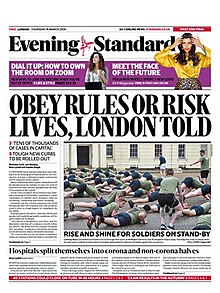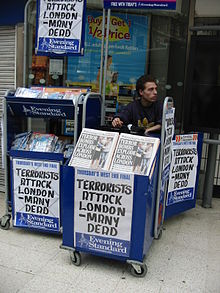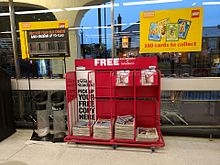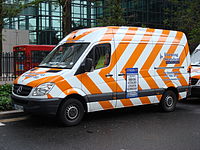Evening Standard
 Evening Standard cover (19 March 2020) | |
| Type | Regional free newspaper |
|---|---|
| Format | Tabloid |
| Owner(s) |
|
| Editor | Dylan Jones |
| Founded | 21 May 1827 |
| Language | English |
| Headquarters | Alphabeta, 14–18 Finsbury Square, London |
| Circulation | 273,631 (as of August 2024)[2] |
| ISSN | 2041-4404 |
| Website | www |


The London Standard, formerly the Evening Standard (1904–2024) and originally The Standard (1827–1904), is a long-established regional newspaper published weekly and distributed free of charge in London, England. It is printed in tabloid format, and also has an online edition.
In October 2009, after being purchased by Russian businessman Alexander Lebedev, the paper ended a 180-year history of paid circulation and multiple editions every day, and became a free newspaper publishing a single print edition every weekday, doubling its circulation as part of a change in its business plan.
On 29 May 2024, the newspaper announced that it would reduce print publication to once weekly, after nearly 200 years of daily publication, as it had become unprofitable. Daily publication ended on 19 September 2024. The first weekly edition was published on 26 September 2024 under the new name of The London Standard.
History
[edit]From 1827 to 2009
[edit]This section needs additional citations for verification. (October 2024) |
The newspaper was founded by barrister Stanley Lees Giffard on 21 May 1827 as The Standard.[3] The early owner of the paper was Charles Baldwin. Under the ownership of James Johnstone, The Standard became a morning paper from 29 June 1857. The Evening Standard was published from 11 June 1859. The Standard gained eminence for its detailed foreign news, notably its reporting of events of the American Civil War (1861–1865), the Austro-Prussian War of 1866, and the Franco-Prussian War of 1870, all contributing to a rise in circulation.[4] By the end of the 19th century, the evening edition eclipsed its morning counterpart.[citation needed]
Both The Standard and the Evening Standard were acquired by C. Arthur Pearson in 1904.[5] In May 1915, Edward Hulton purchased the Evening Standard from Davison Dalziel.[6] Dalziel had purchased both papers in 1910,[7] and closed The Standard, the morning paper, in 1916.[5] Hulton introduced the gossip column Londoner's Diary, originally billed as "a column written by gentlemen for gentlemen".[citation needed]
In 1923, Lord Beaverbrook, owner of the Daily Express, bought Hulton's newspapers, although he sold them shortly thereafter to the Daily Mail's owner Lord Rothermere, with the exception of the Standard. It became a staunchly Conservative paper, harshly attacking Labour in 1945 in a high-profile campaign that backfired. In the 1960s, the paper was upstaged by The Evening News, which sold more than 1 million copies nightly.[citation needed] During the decade, the paper also began to publish the comic strip Modesty Blaise, which bolstered its sales throughout the 1970s. The Evening Standard ceased publishing on Saturdays on 30 November 1974, when it still produced six editions daily.[8] In the 1960s, the paper's political editor Robert Carvel was granted a morning briefing by prime minister Harold Wilson and it had its own correspondents in Paris and Washington.[9]
In 1980, Express Newspapers merged the Standard with Associated Newspapers' Evening News in a Joint Operating Agreement.[citation needed] The new paper was known as the New Standard until 1985, when Associated Newspapers bought out the remaining stake, turning it into The Standard.[citation needed] In 1987 the Evening News was briefly revived to compete with Robert Maxwell's London Daily News, but was reabsorbed into The Standard later that year, after the collapse of Maxwell's paper.[citation needed] In 1988 the Evening Standard included the by-line "Incorporating the 'Evening News'", which remained until the paper's sale in 2009.[citation needed]
Lebedev takeover
[edit]On 21 January 2009, the Russian businessman and former KGB agent Alexander Lebedev and his son Evgeny Lebedev, who in 2010 went on to own The Independent, agreed to acquire control of the Evening Standard for £1 for 64 per cent ownership.[1][10] A few years earlier, 12 per cent of the paper had been sold to Justin Shaw and Geordie Greig.[citation needed] Associated Newspapers retained the remaining 24 per cent.[citation needed]
In November 2009, it was announced that the London Evening Standard would drop its morning "News Extra" edition from 4 January 2010. From then on, the first edition was the "West End Final", available from 2 pm.[11] One edition of 600,000 copies would be printed starting at 12:30 pm, ending 5.30 am starts for journalists and the previous deadline of 7 am for the first edition. Twenty people were expected to lose their jobs as a result.[11]
There were often considerable changes between editions in the front-page lead and the following news pages, including the Londoner's Diary, though features and reviews stayed the same.[12] In January 2010, circulation was increased to 900,000.[13]
May 2009 relaunch
[edit]
In May 2009, the newspaper launched a series of poster ads, each of which prominently featured the word "Sorry" in the paper's then-masthead font. These ads offered various apologies for past editorial approaches, such as "Sorry for losing touch".[14] None of the posters mentioned the Evening Standard by name, although they featured the paper's Eros logo. Ex-editor Veronica Wadley criticised the "Pravda-style" campaign saying it humiliated the paper's staff and insulted its readers.[15]
The campaign was designed by McCann Erickson. Also in May 2009, the paper relaunched as the London Evening Standard with a new layout and masthead, marking the occasion by giving away 650,000 free copies on the day,[16] and refreshed its sports coverage.[17]
October 2009: freesheet
[edit]After a long history of paid circulation, on 12 October 2009, the Standard became a free newspaper,[18][19] with free circulation of 700,000, limited to central London.[citation needed] In February 2010, a paid-for circulation version became available in suburban areas of London for 20p (although many places sell it for 50p).[20][21] The newspaper won the "Media Brand of the Year" and the "Grand Prix Gold" awards at the Media Week awards in October 2010. The judges said: "[The Standard has] quite simply ... stunned the market. Not just for the act of going free, but because editorial quality has been maintained, circulation has almost trebled and advertisers have responded favourably. Here is a media brand restored to health."[22] The Standard also won the daily newspaper of the year award at the London Press Club Awards in May 2011.[23]
May 2010: mobile application
[edit]The Evening Standard launched a mobile app with US app developer Handmark in May 2010.[24] The range of apps was updated in 2015.[25]
March 2018: redesign
[edit]In March 2018, editor George Osborne initiated a redesign of the paper, which included dropping the "London" from its title in a signal of the paper's ambition to have greater national and international influence.[26] The paper also introduced more colourful "signposting" for different sections such as news, comment, and business, as it was noted by Osborne that it had not been "easy" to find them inside the paper previously.[26] The masthead was also redesigned with a new font, and emojis were added to the paper's five-day weather forecast.[27]
May 2018: financial sponsorship
[edit]In May 2018, James Cusick of openDemocracy alleged the newspaper had been providing favourable news coverage to companies, including Uber and Google, in exchange for financial sponsorship.[28][29]
June 2019: Job cuts
[edit]In June 2019, the Evening Standard announced job cuts.[30] By the end of 2019, the company reported a pre-tax loss of £13.6 million. In August 2020, the paper announced a further 115 job cuts in order to save the company.[31]
2024: from daily to weekly, with redundancies
[edit]Before the COVID-19 pandemic that started in 2020, the Evening Standard's daily circulation was about 800,000. By mid-2024, it had dropped below 300,000.[32]
On 29 May 2024, the newspaper announced that it would go from a daily to weekly print publication as it was unprofitable.[33][34] The newspaper had dropped from about 70 to 30 pages in the preceding decade.[35] The change was made by Lebedev under pressure by Sultan Muhammad Abuljadayel, who has owned a 30% stake in the Evening Standard's parent company since 2018.[36]
On 14 June 2024, the newspaper announced it would eliminate 150 jobs. The redundancies included 70 editorial workers (out of 120), 40 office workers and 45 workers from the paper's printing and distribution operations at Broxbourne.[35] Lebedev proposed to make statutory minimum payments plus £1,000, capped at £21,000, to those made redundant.[37]
On 29 July 2024, the last Friday and Monday editions had been printed,[38] and on Thursday 19 September 2024 the last daily format edition was printed.[39] The weekly edition was published on Thursdays from 26 September 2024 under the new name of "The London Standard".[40][41]
Editorial style
[edit]From July 2020 to October 2021, the newspaper's editor was Emily Sheffield, sister of Samantha Cameron, who took over from the former Chancellor of the Exchequer George Osborne, who became editor-in-chief.[citation needed] As editor he had replaced Sarah Sands who, in turn, had replaced Geordie Greig following his departure to The Mail on Sunday in March 2012.[42] Veronica Wadley was the newspaper's editor between 2002 and 2009.[43] Max Hastings was editor from 1996 until he retired in 2002.[citation needed]
The Evening Standard, a regional newspaper, emphasises London-centred news (especially in its features pages), covering building developments, property prices, traffic schemes, politics, the congestion charge and, in the Londoner's Diary page, gossip on the social scene, and also covers significant national and international news.[citation needed] It also occasionally runs campaigns on London issues that national newspapers do not cover in detail.[citation needed]
It has a tradition of providing arts coverage. Its best known former art critic, Brian Sewell, was known for his acerbic view of conceptual art, Britart and the Turner Prize[44] and his views attracted controversy and criticism in the art world.[45] He has been described as "Britain's most famous and controversial art critic".[46]
Political stance
[edit]During the 2008 London mayoral election, the newspaper – and particularly the correspondent Andrew Gilligan – published articles in support of the Conservative candidate, Boris Johnson, including frequent front-page headlines condemning Labour opponent Ken Livingstone. This included the headline "Suicide bomb backer runs Ken's campaign".[47]
On 5 May 2010, the newspaper stated in an editorial that, having supported Labour under Tony Blair, the newspaper would be supporting David Cameron and the Conservatives in the general election, saying that "the Conservatives are ready for power: they look like a government in waiting".[48] On 5 May 2015, an editorial stated that the newspaper would again be supporting David Cameron and the Conservatives in the 2015 General Election, saying that the Conservatives have "shown themselves to be good for London". The newspaper also said "there may be good tactical reasons to vote Liberal Democrat".[49]
The Media Reform Coalition (MRC) and Goldsmiths, University of London considered that in the 2016 elections, the Evening Standard favoured the Conservative Party, according to MRC chair Justin Schlosberg. There were almost twice as many positive headlines about the Conservative candidate, Zac Goldsmith, as for his Labour rival, Sadiq Khan, with stories exhibiting the strongest bias against Khan also being the most prominent.[50]
In the 2017[51] and 2019 United Kingdom general elections, the Evening Standard endorsed the Conservative Party.[52]
During the 2019 Conservative leadership election, the Evening Standard endorsed Boris Johnson.[53] During the 2020 Labour leadership election, the Evening Standard endorsed Keir Starmer to become Labour leader and consequently Leader of the Opposition.[54]
The Evening Standard endorsed Liz Truss in the July–September 2022 Conservative Party leadership election.[55]
For the 2024 London mayoral election, the Evening Standard endorsed Labour candidate Sadiq Khan for Mayor of London.[56] The Evening Standard later endorsed the Labour Party in the 2024 United Kingdom general election.[57]
Freesheet and supplements
[edit]On 14 December 2004, Associated Newspapers launched a Monday–Friday freesheet edition of the Evening Standard called Standard Lite to help boost circulation. This edition had 48 pages, compared with about 80 in the main paper, which also had a supplement on most days.[58]
In August 2006, the freesheet was relaunched as London Lite. It was designed to be especially attractive to younger female readers and featured a wide range of lifestyle articles, but less news and business news than the main paper. It was initially available only between 11:30 a.m. and 2:30 p.m. at Evening Standard vendors and in the central area, but later became available in the evening from its street distributors.[59] With the sale of the Evening Standard, but not the London Lite, to Alexander Lebedev on 21 January 2009, the ownership links between the Standard and the Lite were broken.[60]
On Fridays, the newspaper includes a free glossy lifestyle magazine, ES (launched as the Evening Standard Magazine in 2009,[61]) and the circulation was increased to 350,000 in September 2014.[citation needed] This has moved from more general articles to concentrate on glamour, with features on the rich, powerful and famous.[citation needed] On Wednesdays, some areas offer a free copy of the Homes & Property supplement, edited by Janice Morley, which includes London property listings and articles from lifestyle journalists including Barbara Chandler, Katie Law, and Alison Cork.[citation needed]
A free entertainment guide supplement Metro Life, previously called Hot Tickets, was published on Thursdays from September 2002 to September 2005. This was a "what's-on" guide with listings of cinemas and theatres in and around London.[citation needed]
-
The Evening Standard has a fleet of delivery vans painted in a distinctive orange and white livery.
-
Delivering the Evening Standard to Euston Station, September 2022
Editors
[edit]Editors, with their year of appointment, have been:
- 1827: Stanley Lees Giffard[62]
- 1846: Robert Knox
- 1857: Thomas Hamber (The Standard)[63]
- 1860: Charles Williams[63]
- 1863: Thomas Hamber[63]
- 1870: James Johnstone Jr. and John Gorst[63]
- 1876: W. H. Mudford[64]
- 1899: Byron Curtis[65]
- 1906: William Woodward[65]
- 1912: James A. Kilpatrick[65]
- 1914: D. M. Sutherland
- 1916: Arthur Mann
- 1920: D. Phillips
- 1923: E. Raymond Thompson
- 1928: George Gilliat
- 1933: Percy Cudlipp
- 1937: Reginald John Tanner Thompson
- 1938: Frank Owen
- 1942: Michael Foot
- 1943: Sydney Elliott
- 1945: Bert Gunn
- 1952: Percy Elland
- 1959: Charles Wintour
- 1976: Simon Jenkins
- 1978: Charles Wintour
- 1980: Louis Kirby
- 1986: John Leese
- 1991: Paul Dacre
- 1992: Stewart Steven
- 1996: Max Hastings
- 2002: Veronica Wadley
- 2009: Geordie Greig
- 2012: Sarah Sands
- 2017: George Osborne
- 2020: Emily Sheffield
- 2021: Charlotte Ross (acting)
- 2022: Jack Lefley (acting) [66]
- 2023: Dylan Jones[67]
Journalists
[edit]This section needs additional citations for verification. (August 2024) |
- George Orwell, author of Nineteen Eighty-Four and Animal Farm
- John Lahr, biographer and theatre critic
- John Preston, former arts editor
- Julie Burchill, author
- Jack Massarik, jazz critic[68]
References
[edit]- ^ a b Brook, Stephen; Sweney, Mark (21 January 2009). "Alexander Lebedev's Evening Standard takeover: Dacre announces sale to staff". The Guardian. Retrieved 21 January 2009.
- ^ "Evening Standard". Audit Bureau of Circulations (UK). 13 September 2024. Retrieved 13 October 2024.
- ^ Brook, Stephen (14 January 2009). "A history of the London Evening Standard: seeing off rivals for 181 years". The Guardian. London. Retrieved 24 November 2018.
- ^ Encyclopædia Britannica Eleventh Edition; Cambridge University Press, 1911, Vol. XIX, Mun to Oddfellows; Article on Newspapers, pp. 544–581.
- ^ a b Griffiths, Dennis (1992). The Encyclopedia of the British Press, 1422–1992 (illustrated ed.). London & Basingstoke: Macmillan. p. 234. ISBN 978-0-333-52984-3.
- ^ Griffiths, Encyclopedia of the British Press, p. 324
- ^ Griffiths, Encyclopedia of the British Press, p.188
- ^ "Where are they now, those Saturday People?". 47shoelane. 1 November 2015.
- ^ Jenkins, Simon (30 May 2024). "So it's goodbye to London's Standard, my old paper – and to the heart of democracy, local news". The Guardian. Retrieved 30 May 2024.
- ^ "Ex-KGB Spy Buys UK Paper for £1". BBC News. 21 January 2009. Retrieved 21 January 2009.
- ^ a b Sweney, Mark (26 November 2009). "London Evening Standard drops noon edition and cuts jobs". The Guardian. London. Retrieved 31 March 2012.
- ^ "ESI Media (Independent, Standard)". MagForum. Retrieved 24 November 2018.
- ^ Reynolds, John (10 July 2013). "London Evening Standard owner plots circulation increase to 900,000 copies". The Guardian. London. Retrieved 24 November 2018.
- ^ Greenslade, Roy (4 May 2009). "Evening Standard Launches Ad Campaign To Say Sorry to Londoners". Greenslade Blog. Retrieved 4 August 2012 – via The Guardian.
- ^ Bowser, Jacquie (11 May 2009). "Ex-Editor Wadley Criticises Standard's 'Pravda-Style' Relaunch". Brand Republic. Retrieved 29 May 2024.
- ^ Brook, Stephen (11 May 2009). "London Evening Standard Relaunch – Who's Sorry Now?". Organ Grinder Blog. Retrieved 4 August 2012 – via The Guardian.
- ^ Brook, Stephen (27 May 2009). "London Evening Standard Revamps Sport Pages". The Guardian. London. Retrieved 31 March 2012.
- ^ "London's 'Evening Standard' To Become Free Paper". Editor & Publisher. 2 October 2009. Archived from the original on 4 October 2009.
- ^ "Evening Standard To Be Free Paper". BBC News. 2 October 2009. Retrieved 29 May 2024.
- ^ Busfield, Steve (15 February 2010). "How Much for a 'Free' London Evening Standard? 50p in Some Shops". Greenslade Blog. Retrieved 4 August 2012 – via The Guardian.
- ^ Nicholas, Dean (15 February 2010). "Evening Standard No Longer Free In Some Parts". Londonist. Londonist. Retrieved 29 May 2024.
- ^ "'Evening Standard' Wins Top Awards". The Independent. ESI Media. 30 October 2010. Retrieved 30 October 2010.
- ^ "Evening Standard Wins Newspaper of the Year Award". Press Gazette. 15 May 2011. Archived from the original on 12 January 2012. Retrieved 15 May 2011.
- ^ Deans, Jason (24 April 2010). "London Evening Standard launches smartphone app". The Guardian. Retrieved 11 October 2018.
- ^ Sampson, Jessie (15 January 2015). "Evening Standard launches new app range". Newsworks. Archived from the original on 11 October 2018. Retrieved 11 October 2018.
- ^ a b Burrell, Ian (12 March 2018). "George Osborne on his Evening Standard revamp and dropping London from its masthead". The Drum. Retrieved 27 March 2018.
- ^ Mayhew, Freddy (12 March 2018). "Evening Standard redesign: Weather 'poo' emojis, no more 'London' in masthead and pink business pages". Press Gazette. Retrieved 27 March 2018.
- ^ Cusick, James (30 May 2018). "George Osborne's London Evening Standard sells its editorial independence to Uber, Google and others – for £3 million". openDemocracy.
- ^ Sambrook, Richard (1 June 2018). "Fake news week: three stories that reveal the extreme pressure journalism is now under". The Conversation.
- ^ Tobitt, Charlotte (4 June 2019). "Evening Standard theatre critics axed as part of 'necessary cost-cutting'". Press Gazette. London. Retrieved 29 May 2024.
- ^ Barker, Alex (7 August 2020). "Evening Standard to cut a third of jobs as Covid-19 bites". Financial Times. London. Archived from the original on 10 December 2022. Retrieved 8 August 2020.
- ^ Tobitt, Charlotte (15 August 2024). "Newspaper ABCs: Sunday People sees biggest print decline in July". Press Gazette. Retrieved 20 August 2024.
- ^ Waterson, Jim (29 May 2024). "London Evening Standard to close daily newspaper and launch new weekly". The Guardian. Retrieved 29 May 2024.
- ^ Maher, Bron (29 May 2024). "Evening Standard set to go from daily to weekly print edition". Press Gazette. Retrieved 29 May 2024.
- ^ a b Warrington, James (14 June 2024). "Evening Standard to axe 150 jobs as it scraps daily newspaper". The Telegraph. ISSN 0307-1235. Retrieved 15 June 2024.
- ^ Sherwin, Adam (13 June 2024). "Lebedev closed daily Evening Standard after pressure from Saudi investor". i. Retrieved 15 June 2024.
- ^ Warrington, James (9 August 2024). "Evening Standard owner Lord Lebedev accused of closing newspaper 'on the cheap'". The Daily Telegraph. Retrieved 22 August 2024.
- ^ @pressgazette (29 July 2024). "Today's edition of the Evening Standard was its last on a Monday, and last week was its last on a Friday" (Tweet) – via Twitter.
- ^ Kelly, James W. (19 September 2024). "London Evening Standard prints final daily paper". BBC News. Retrieved 19 September 2024.
- ^ Maher, Bron (21 August 2024). "Weekly Evening Standard to be distributed on Thursdays as 'The London Standard'". Press Gazette. Retrieved 22 August 2024.
- ^ Wilkinson, Mark (26 September 2024). "The London Standard hits the streets for the first time". The London Standard. Retrieved 29 September 2024.
- ^ Sabbagh, Dan (30 March 2012). "Sarah Sands Is New Editor of London Evening Standard". The Guardian. Retrieved 31 March 2012.
- ^ Wadley, Veronica (11 May 2009). "Ex-Evening Standard Editor Veronica Wadley's Verdict on Paper's New Regime". The Guardian. Retrieved 31 March 2012.
- ^ Adams, Stephen (30 November 2009). "Tate's collections 'wretched', says Brian Sewell". The Daily Telegraph.
- ^ Jones, Jonathan (20 September 2015). "Brian Sewell's pungent views got people arguing – that's what matters". The Guardian. Retrieved 4 November 2018.
- ^ Cooke, Rachel (13 November 2005). "We pee on things and call it art". The Guardian. Retrieved 30 November 2008.
- ^ White, Michael (16 April 2008). "As Polls Move Towards Ken, Evening Standard Seems Rattled". The Guardian. Retrieved 27 April 2009.
- ^ "David Cameron: The Prime Minister That London Now Needs". London Evening Standard. 5 May 2010. Archived from the original on 7 May 2010.
- ^ "Vote for London: The Standard urges readers to think of what's best for the capital... and support the Tories in the election". London Evening Standard. 5 May 2015. Retrieved 29 May 2024.
- ^ Martinson, Jane (27 April 2016). "London Evening Standard is 'Tory mouthpiece' – research". The Guardian. Retrieved 27 April 2016.
- ^ Heywood, Andrew; Schindler, Kathy; Tomes, Adam (8 July 2021). Essentials of UK Politics and Government. Bloomsbury Publishing. p. 175. ISBN 9781352012309.
- ^ Evening Standard Comment (11 December 2019). "Comment: Vote for Boris — Corbyn is unfit to lead Britain". Evening Standard. Retrieved 11 December 2019.
- ^ "Evening Standard comment: We back Boris as the PM to turn Britain around". Evening Standard. 20 June 2019. Retrieved 29 September 2019.
- ^ "Comment: Sir Keir Starmer can offer the opposition Britain needs". Evening Standard. 1 April 2020. Retrieved 2 April 2020.
- ^ "Evening Standard backs Liz Truss". Evening Standard. 10 August 2022. Retrieved 11 October 2022 – via PressReader.
- ^ "The Standard View: Why Sadiq Khan is our pick for Mayor of London". Evening Standard. 1 May 2024. Retrieved 1 May 2024.
- ^ Comment, Evening Standard (3 July 2024). "The Standard View: After 14 years, London wants change — now Labour must deliver". Evening Standard. Retrieved 27 September 2024.
- ^ Cozens, Claire (10 December 2004). "Media buyers voice fears over 'downmarket' free Standard". The Guardian. Retrieved 1 June 2015.
- ^ Brook, Stephen (25 August 2006). "Some Lite relief". The Guardian. Retrieved 1 June 2015.
- ^ Brook, Stephen (5 October 2009). "Associated Newspapers backs Evening Standard decision to go free". The Guardian.
- ^ "UK national newspapers". MagForum. Retrieved 9 June 2018.
- ^ "London Evening Standard". The British Newspaper Archive. Retrieved 8 August 2020.
- ^ a b c d Crapster, Basil L. (December 1975). "Thomas Hamber, 1828–1902 Tory Journalist". Victorian Periodicals Newsletter. 8 (4). The Johns Hopkins University Press on behalf of the Research Society for Victorian: 116, 118. JSTOR 20085087.
- ^ Chisholm, Hugh (1911). "Newspapers". In Chisholm, Hugh (ed.). Encyclopædia Britannica (11th ed.). Cambridge University Press. p. 560.
- ^ a b c Griffiths, Dennis (27 July 2016). Plant Here The Standard. Springer. pp. 151, 164, 193. ISBN 978-1-349-12461-9.
- ^ "Evening Standard: Charlotte Ross". InPublishing. 21 July 2022. Retrieved 21 December 2022.
- ^ Turvill, William (30 May 2023). "Former GQ chief Dylan Jones named editor of the Evening Standard". Press Gazette. Retrieved 30 July 2023.
- ^ Cornwell, Jane (16 July 2014). "A passionate jazzman: Jack Massarik obituary". Evening Standard. Retrieved 16 August 2024.


